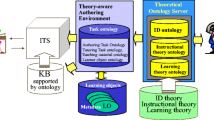Abstract
When designing and developing ontology based applications, we semantically ground them by ontologically committing the application rules to their respective domain. These rules can be, for instance decision rules for a decision support system. For the DOGMA framework we have introduced ORM + , a novel extension of ORM for modeling, visualizing and interchanging ontological commitments. In this paper, we illustrate our ongoing research on ORM + and T-Lex as its supporting tool. We demonstrate in the field of on-line customer management.
Preview
Unable to display preview. Download preview PDF.
Similar content being viewed by others
References
Curland, M., Halpin, T.: Model Driven Development with NORMA. In: Proc. 40th Int. Conf. on System Sciences (HICSS-40). CD-ROM, p. 10. IEEE Computer Society, Los Alamitos (2007)
Demey, J., Jarrar, M., Meersman, R.: Markup Language for ORM Business Rules. In: Proc. Of International Workshop on Rule Markup Languages for Business Rules on the Semantic Web (RuleML-ISWC 2002 workshop) (2002)
Eades, P.: A heuristic for graph drawing. Congressus Numerantium 42, 149–160 (1984)
Fluit, C., Sabou, M., van Harmelen, F.: Supporting user tasks through visualisation of light-weight ontologies. In: Staab, S., Studer, R. (eds.) Handbook on Ontologies. Int. Handbooks on Information Systems, pp. 415–434. Springer, Heidelberg (2004)
Gabel, T., Sure, Y., Völker, J.: Kaon – ontology management infrastructure. SEKT informal deliverable 3.1.1.a, Institute AIFB, University of Karlsruhe (2004)
Gomez-Perez, A., Corcho, O., Fernandez-Lopez, M.: Ontological Engineering. Springer, New York (2003)
Gruber, T.R.: Toward Principles for the Design of Ontologies Used for Knowledge Sharing. In: Guarino, N., Poli, R. (eds.) Workshop on Formal Ontology, Padva, Italy. Formal Ontology in Conceptual Analysis and Knowledge Representation. Kluwer Academic Publishers, Dordrecht (1993)
Guarino, N.: Understanding, Building, and Using Ontologies: A commentary to Using Explicit Ontologies in KBS Development. In: van Heijst, S., Wielinga (eds.) International Journal of Human and Computer Studies 46, 293–310 (1997), http://citeseer.ist.psu.edu/guarino97understanding.html
Halpin, T.A.: Information Modeling and Relational Databases: From Conceptual Analysis to Logical Design. Morgan Kaufman Publishers, San Francisco (2001)
Halpin, T.A.: Business Rule Modality. In: Proc. Of Eleventh Workshop on Exploring Modeling Methods for Systems Analysis and Design, EMMSAD 2006 (2006), http://www.orm.net/pdf/RuleModality.pdf
Halpin, T.A., Curland, M.: Automated Verbalization for ORM 2. In: Meersman, R., Tari, Z., Herrero, P. (eds.) OTM 2006 Workshops. LNCS, vol. 4278, pp. 1181–1190. Springer, Heidelberg (2006)
Kripke, S.: Semantical Considerations on Modal Logic. APF 16, 83–94 (1963)
Lambrix, P., Edberg, A.: Evaluation of ontology merging tools in bioinformatics. In: Pacific Symposium on Biocomputing, pp. 589–600 (2003)
Meersman, R.: The use of lexicons and other computer-linguistic tools in semantics, design and cooperation of database systems. In: Zhang, Y., Rusinkiewicz, M., Kambayashi, Y. (eds.) The Proceedings of the Second International Symposium on Cooperative Database Systems for Advanced Applications (CODAS 1999), pp. 1–14. Springer, Heidelberg (1999)
Mutton, P., Golbeck, J.: Visualization of semantic metadata and ontologies. In: IV 2003: Proceedings of the Seventh Int. Conference on Information Visualization, Washington, DC, USA, p. 300. IEEE Computer Society, Los Alamitos (2003)
Noy, N.F., McGuinness, D.L.: Ontology development 101: A guide to creating your first ontology. Technical Report KSL-01-05, Knowledge Systems Laboratory, Stanford University, Stanford, CA, 94305, USA (2001)
Pretorious, J.A.: Lexon visualization: Visualizing binary fact types in ontology bases. In: Lambrix, P., Edberg, A. (eds.) IV 2004, pp. 58–6310 (2004); Evaluation of ontology merging tools in bioinformatics. In: Pacific Symposium on Biocomputing, pp. 589–600 (2003)
Spyns, P., Meersman, R., Jarrar, M.: Data modeling versus Ontology engineering. SIGMOD Record: Special Issue on Semantic Web and Data Management 31(4), 12–17 (2002)
Storey, M., Musen, M., Silva, J., Best, C., Ernst, N., Fergerson, R., Noy, N.: Jambalaya: Interactive visualization to enhance ontology authoring and knowledge acquisition in protégé (2001)
Sure, Y., Erdmann, M., Angele, J., Staab, S., Studer, R., Wenke, D.: OntoEdit: Collaborative ontology development for the Semantic Web. In: Horrocks, I., Hendler, J. (eds.) ISWC 2002. LNCS, vol. 2342, pp. 221–235. Springer, Heidelberg (2002)
Tang, Y., Spyns, P., Meersman, R.: Towards Semantically Grounded Decision Rules Using ORM+. In: Paschke, A., Biletskiy, Y. (eds.) RuleML 2007. LNCS, vol. 4824, pp. 78–91. Springer, Heidelberg (2007)
Tang, Y., Meersman, R.: On constructing semantic decision tables. In: Wagner, R., Revell, N., Pernul, G. (eds.) DEXA 2007. LNCS, vol. 4653, pp. 34–44. Springer, Heidelberg (2007)
Trog, D., Vereecken, J., Christiaens, S., De Leenheer, P., Meersman, R.: T-Lex: a Role-based Ontology Engineering Tool. In: Meersman, R., Tari, Z., Herrero, P. (eds.) OTM 2006 Workshops. LNCS, vol. 4278, pp. 1191–1200. Springer, Heidelberg (2006)
Trog, D., Tang, Y., Meersman, R.: Towards Ontological Commitments with O-RIDL Markup Language. In: Paschke, A., Biletskiy, Y. (eds.) RuleML 2007. LNCS, vol. 4824, pp. 92–106. Springer, Heidelberg (2007)
Author information
Authors and Affiliations
Editor information
Editors and Affiliations
Rights and permissions
Copyright information
© 2008 Springer-Verlag Berlin Heidelberg
About this paper
Cite this paper
Tang, Y., Trog, D. (2008). Model Ontological Commitments Using ORM + in T-Lex. In: Meersman, R., Tari, Z., Herrero, P. (eds) On the Move to Meaningful Internet Systems: OTM 2008 Workshops. OTM 2008. Lecture Notes in Computer Science, vol 5333. Springer, Berlin, Heidelberg. https://doi.org/10.1007/978-3-540-88875-8_103
Download citation
DOI: https://doi.org/10.1007/978-3-540-88875-8_103
Publisher Name: Springer, Berlin, Heidelberg
Print ISBN: 978-3-540-88874-1
Online ISBN: 978-3-540-88875-8
eBook Packages: Computer ScienceComputer Science (R0)




